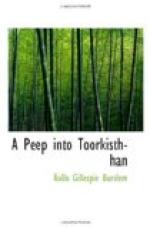But to return to our wanderings. As I said before, we left Ghoree early in the morning of the 28th, and soon reached the foot of the hills, ascending a narrow valley which gradually contracted into a rocky ravine. As we traversed the higher levels all vegetation ceased, excepting the Pista tree already alluded to; yet there must have been some herbage in the gullies, as we saw several flocks of wild goats, so wild indeed that it was impossible to get within rifle range of them. We had heard of a place called Shull[=a]ctoo, within the distance of a day’s march, and conceiving naturally that it was a habitation of men, we determined to pass the night there. As the evening advanced, the aspect of the country assumed a still wilder and more desolate character, our cattle began to show symptoms of distress, and as the hills were apparently destitute of water, we became a little uneasy regarding the nature of our billet. A sudden turn of the ravine brought us to a small open space, without a blade of grass or a vestige of any thing human, which our guide complacently informed us was Shull[=a]ctoo, a mere “locus standi.” After the first feeling of dismay had subsided, we recollected that we had a small supply of food for our horses; and water being now found for the first time since we entered the hills,—and we had come a good sixteen miles,—we determined not to proceed further, so pitching our little tent we made ourselves as comfortable as circumstances would admit.
On the 29th we marched, a distance of fourteen miles, to a small fort called Keune. But I unfortunately commenced the day’s work by losing my way amongst the rocks, with some of the guard: after wandering for some hours, surrounded by scenery the grandeur of which I should better have appreciated under different circumstances, one of the Affgh[=a]n soldiers hit upon a pathway, and seeing a man in the distance, he made for, and, seizing him in the most unceremonious manner, brought him to me. The poor fellow was in the greatest state of alarm; he had evidently never seen a Feringhi before, and fancied that his last hour had arrived. I put a rupee into his hand, and endeavoured to make him understand that we were neither robbers nor murderers, but travellers who had lost their way; he was naturally incredulous, for certainly our appearance gave but small indication of our respectable character.[*] At length we were obliged to intimate that his fears might be realized unless he showed us the way to Keune, which we eventually reached in the evening, much exhausted with our excursion.




